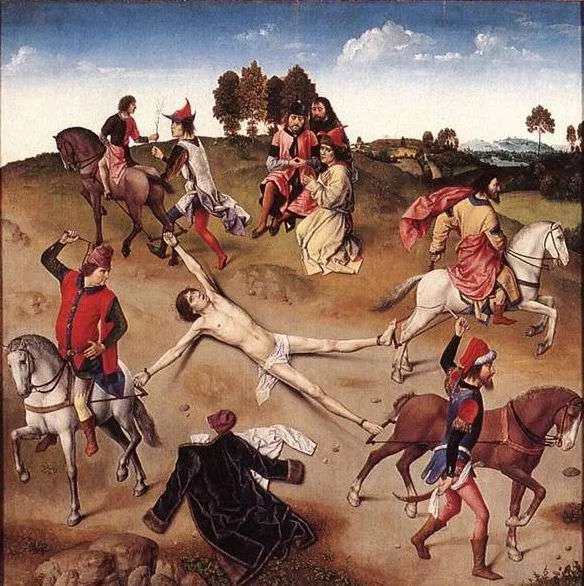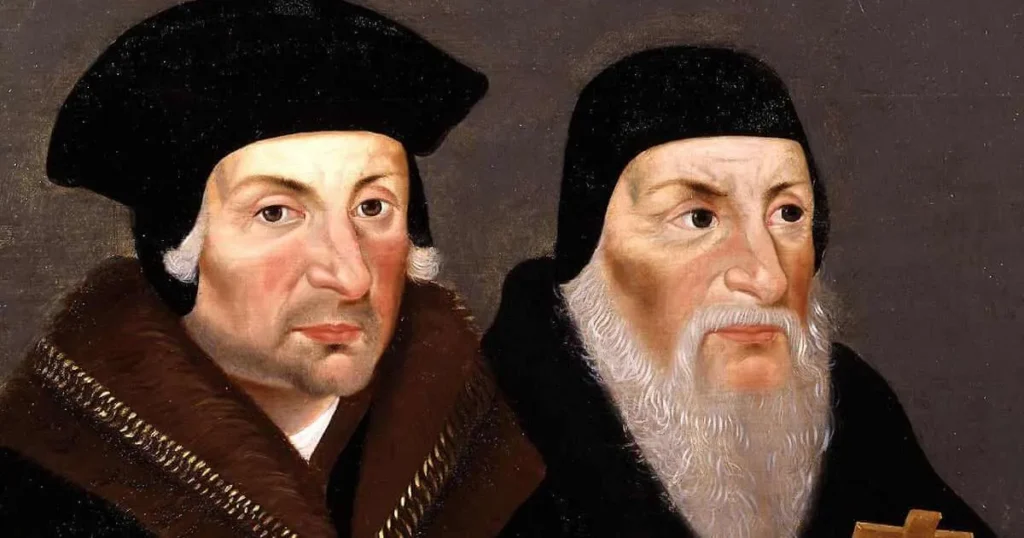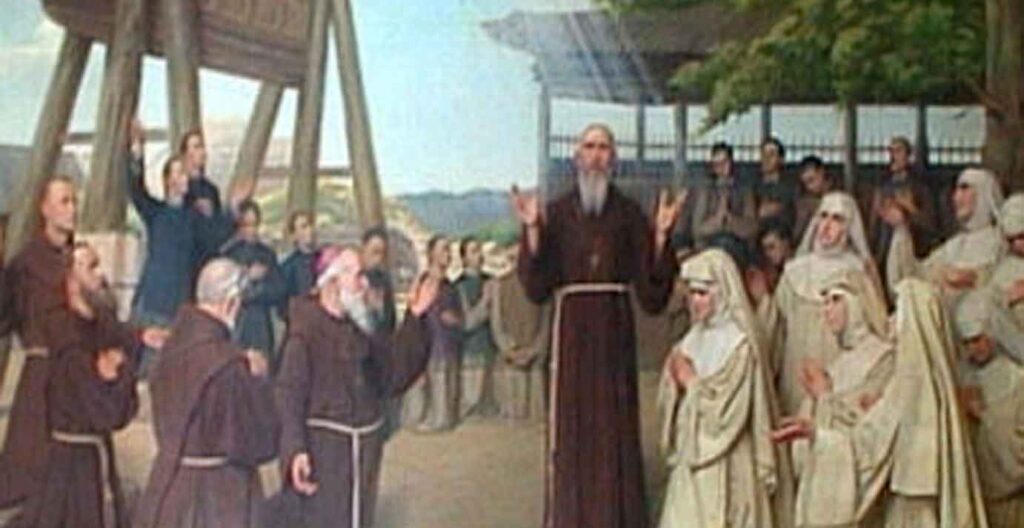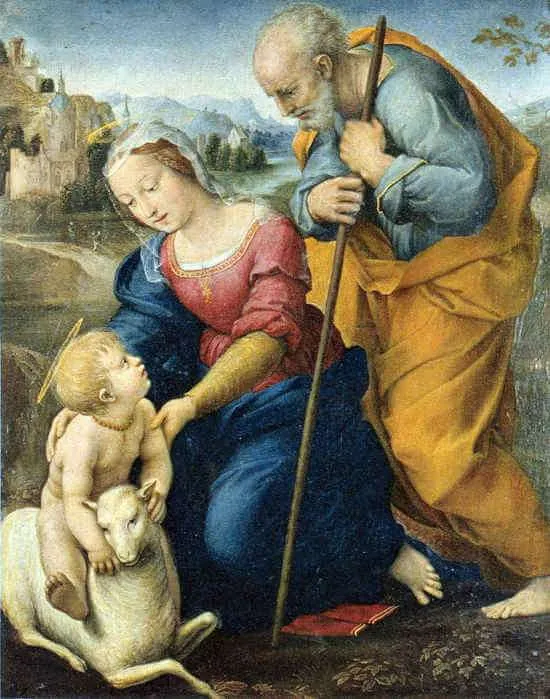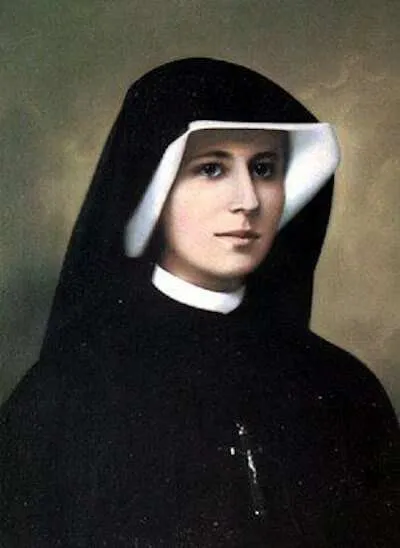Unknown–c. 235; Saint Hippolytus—Patron Saint of horses;
Saint Pontian—Patron Saint of Carbonia and Montaldo Scarampi, Italy;
Pre-Congregation canonization
After Jesus commissioned the Apostles to spread the Gospel to the ends of the earth, Saint John the Evangelist is believed to have converted many, including Saint Polycarp, whom he ordained the Bishop of Smyrna, in modern-day Turkey. Saint Irenaeus became a disciple of Saint Polycarp, and was ordained first a priest and then a bishop in what is now Lyon, France. It is believed that one of today’s saints, Hippolytus, was influenced by, and perhaps even a disciple of Saint Irenaeus.
Saint Irenaeus was a staunch opponent of the emerging heresies of his time. His renowned work, Against Heresies, describes the many errors in the early heresies, especially Gnosticism. Irenaeus died approximately thirty-three years before Hippolytus died, but their paths most likely crossed. The two shared a common mission of eradicating heresy, and Hippolytus was most likely influenced by Bishop Irenaeus. One of Hippolytus’ most famous works is entitled Philosophumena, or “Refutation of All Heresies.” In this work, like Irenaeus, he systematically refutes the heresies of his time, particularly Gnosticism.
Driven by an excess of zeal, Hippolytus came into conflict with Pope Saint Zephyrinus and other presbyters in Rome, whom he believed were too lenient toward certain heresies afflicting the Church, especially modalism, a heresy that denies the distinct persons of the Trinity. When Pope Zephyrinus died and Pope Saint Callixtus was elected in 217, Hippolytus saw Pope Callixtus as too lax and disagreed with his doctrinal approach to reconciling adulterers and murderers, which included legitimizing what Hippolytus saw as invalid marriages. Hippolytus also accused Pope Callixtus, as he had Pope Zephyrinus, of modalism. This led Hippolytus to separate from the Catholic Church and declare himself an antipope. Antipope Hippolytus continued his schism through the pontificates of Pope Callixtus’ two successors, Pope Urban (c. 223–230) and Pope Pontian (230–235).
Pope Pontian’s pontificate was marked by his continued fight against heresies that were rampant in the Church. He particularly fought against heresies concerning the nature of the Holy Trinity. Pontian is also known for his condemnation of the teachings of the renowned theologian Origen. Among Origen’s teachings that were condemned were a belief in the pre-existence of souls and the eventual salvation of all. Despite Origen being an important early theologian within the Church, this condemnation prevented him from formally receiving the title of “saint.” Pope Pontian also had to deal with the ongoing schism led by the antipope Hippolytus throughout his pontificate.
In 235, Maximinus Thrax seized power with the support of his army and became the Roman Emperor. Emperor Maximinus immediately ordered the arrest and imprisonment of Christian leaders. Among the first arrested were Pope Pontian and Antipope Hippolytus, who were both sent to work in the harsh conditions of the mines on the island of Sardinia.
Though their arrest might have seemed tragic, it bore good fruit. While in prison with Pope Pontian, Hippolytus repented of his schism and reconciled with the pope, bringing an end to the division that had lasted approximately eighteen years. Unable to govern the Church from prison, Pope Pontian resigned his position as pope, making him the first pope to do so. The conditions were so severe that both men died as a result, making them martyrs. Pope Anterus succeeded Pope Pontian, but he died within a couple of months. Pope Fabian was then elected and led the Church for the next fourteen years.
The bodies of Hippolytus and Pontian were returned to Rome within a year of their deaths by Pope Fabian. Saint Pontian was buried in the papal crypt in the Catacomb of Callixtus, and Saint Hippolytus in a cemetery on the Via Tiburtina. Eventually, a basilica was erected over the tomb of Saint Hippolytus, indicating the reverence he was held in by the people of Rome and the joy they had for the reconciliation of this martyr with the Church.
Saints Pontian and Hippolytus lived during a challenging time in the history of the Church. They were both fervent defenders of the true nature of the Holy Trinity, and both died for their faith. In addition to his Philosophumena, Saint Hippolytus left us his Apostolic Traditions, which provided a detailed description of the early ordination rites, the reception of catechumens into the Church, and the celebration of the Eucharist. He also left us a commentary on the Prophet Daniel and the Song of Songs, a treatise on Christ and the antichrist found in the books of Daniel and Revelation, and various sermons. Although Saint Pontian did not leave behind any known writings, he left behind the witness of his life and death, his willingness to reconcile with his rival, and his courageous defense of the true doctrines of the Church.
As we honor these two early saints, remember that their struggles are not unlike our own today. Although heresies and challenges change throughout the centuries, they also remain the same. Draw inspiration from the courage and zeal of these two men, and pray that you will be devoted to the Gospel today as they were in their time.
Source: https://mycatholic.life/saints/saints-of-the-liturgical-year/august-13—saints-pontian-pope-and-hippolytus-priest-martyrs/


